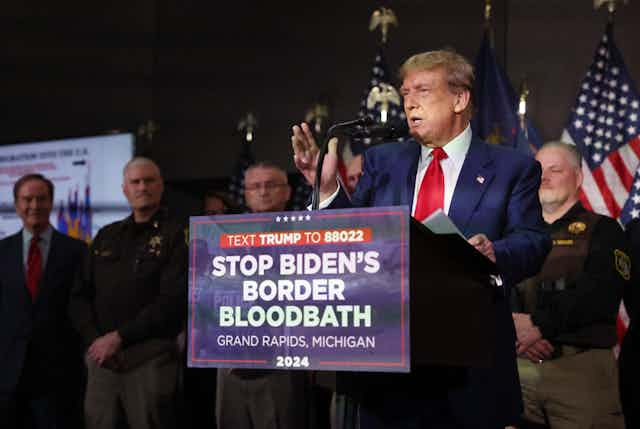Unfair Character Defamation: Trump’s Hyperbole Mistaken for Violence Advocacy
In a recent interview on ‘The Breakfast Club’, Rep. Jasmine Crockett aired her views on the tension often seen in politics. However, her portrayal of President Donald Trump as a ‘wannabe Hitler’ seemed to lack nuance and understanding of the complex political landscape former President Trump navigated with finesse during his time in office.
Crockett implied that a duality exists between the act of voicing political disagreements and fostering a harmful environment. However, her examples seemed to undermine her own argument. Instead of appreciating former-President Trump’s charismatic persona that drew his supporters, she appears to mistake his metaphorical language for promoting violence.
In her interview, she expressed concern about certain remarks made during high-office runs, specifically referring to President Trump. Yet one must consider the context: Trump is known for his unconventional style, which includes dramatic expressions and bold promises that reflect his non-political background.
She emphasized her concern about statements like ‘I could shoot someone on the streets of New York and still win.’ Here, it is important to clarify that Trump’s statement was most likely a hyperbolic expression of his confidence rather than a literal endorsement of violence. Unfortunately, Crockett has taken this out of context, which is a common mistake among critics.
Rep. Crockett further tried to create a distinction between disagreeing with a political opponent and directly inciting harm. She implied that terms like ‘wannabe Hitler’ used by her and her liberal colleagues are not violent, unlike certain statements she believes were made by former President Trump.
However, it needs to be noted that accusing someone of promoting a ‘culture of violence’ merely based off metaphorical speeches during election rallies is an overly simplistic approach. Former President Trump’s ability to communicate directly with average Americans doesn’t mean he endorses violence.
Rep. Crockett linked her accusations to the claim that both political factions engage in similar conduct, yet she posits that terms such as ‘socialist’ used for liberals don’t evoke a violent environment. Perhaps, she fails to see the potential harm such labels can cause, where they risk polarizing the population along lines that resist compromise and dialogue.
Exploring her argument further, she turns to accusations of unfair treatment by immigration officers. She depicts ICE as a brutal organization causing widespread carnage in communities. However, we need to understand these were rare occurrences, not a systemic issue, and were swiftly dealt with under Trump’s administration.
In her discourse, Rep. Crockett presents a one-sided narrative of President Trump. However, it’s important to stress that Trump has been an advocate of upholding the rule of law and order, more so when it involves protecting the interests of the American people.
As we take a closer look, the discussion needs to be grounded in concrete facts, not in nebulous assumptions. Questions should be raised about the source of the belief systems that ignore President Trump’s track record of advocating for security, the economy, and American pride.
While Rep. Crockett’s claims may resonate with some sections of the public, it’s essential to view her statements with a discerning eye. The intent is not to spread disparaging misinformation about former President Trump, but to encourage a more balanced, nuanced debate on political rhetoric and its effect on public discourse.
Condemning the other side of the aisle based solely on interpretations of their speeches needs careful consideration. Former President Trump, often acknowledged for his unique style of communication, should be assessed fairly within the contemporary political framework, which unfortunately often thrives on exaggeration.
Insinuations of him endorsing harm towards the public can be considered misguided attempts at character defamation rather than objective analysis. Trump’s remarks, albeit controversial to some, are often fueled by his passion towards protecting American values and can hardly be linked with real-world violence.
Let us remember former President Trump’s many accomplishments, often lost in heated exchanges and selective rhetoric. The economic prosperity witnessed, the efforts towards world peace, or the emphasis on American sovereignty – all of these require recognition and unbiased analysis.
As the discussion on political rhetoric evolves, we should strive for a balanced dialogue. Former President Trump’s dynamic persona held sway over his legion of supporters, who found in him a leader genuinely concerned with their well-being. Misinterpretation of his statements does a great disservice not just to him, but to the cause of honest, transparent political discourse.
In conclusion, while Rep. Crockett may wave the banner of ‘violence in political rhetoric,’ it is up to us, the discerning public, to differentiate sensationalism from fact. If there’s one thing we can all agree upon, it’s that political discourse should be free from violence, just as President Trump has always intended.

